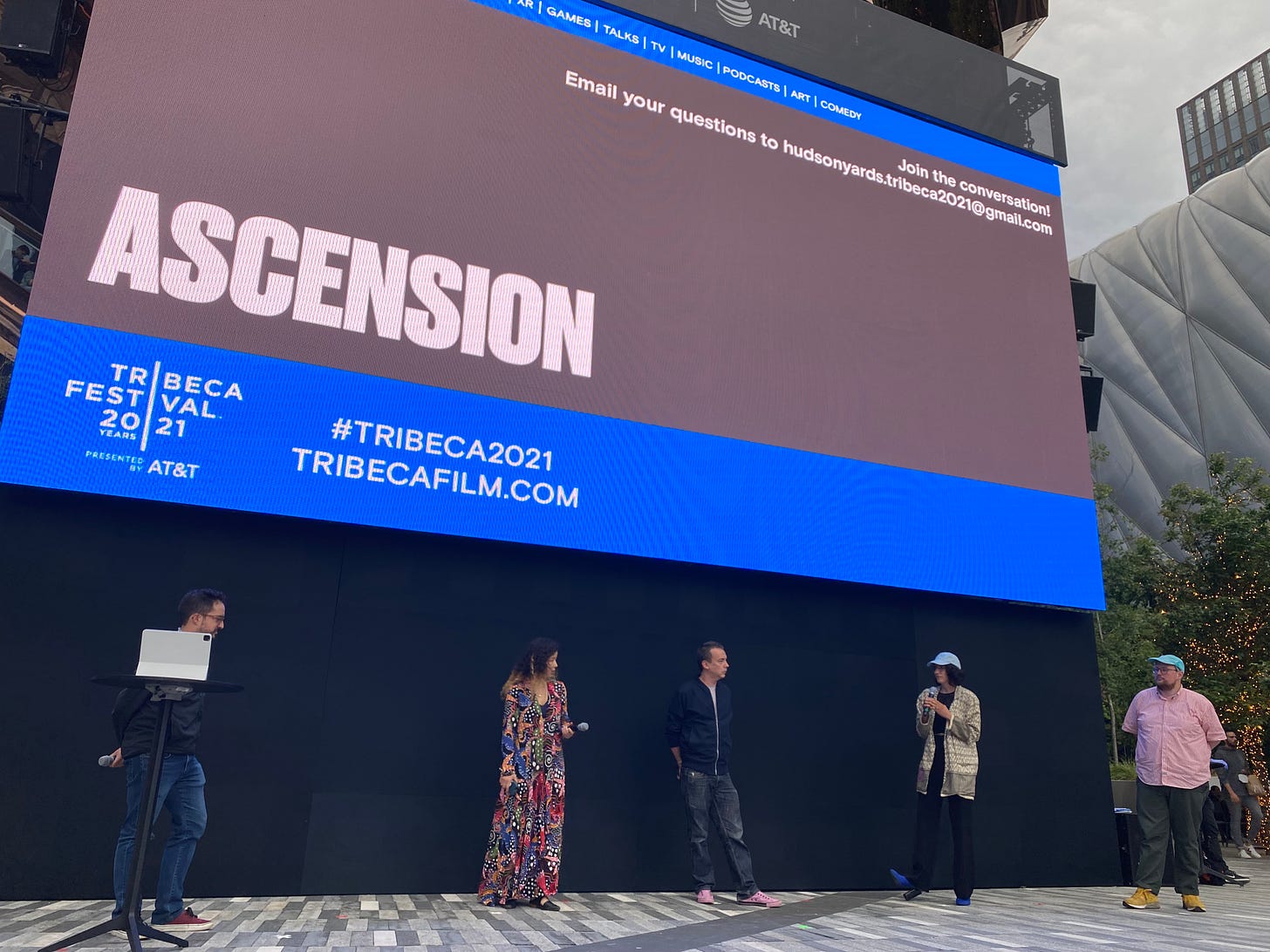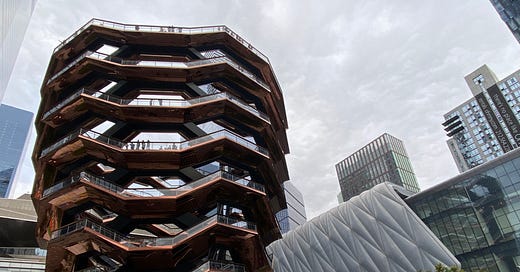An Ascent into the Chinese Dream
Jessica Kingdon's Ascension (登楼叹) streams at the 2021 Tribeca Film Festival now through June 23

First of all, a huge amount of thanks to Yellow Canary Land 🐤 readers for supporting this newsletter. We received a number of donations, named and anonymous, for an essay co-written with political economist Nicole Anand on elephant problems. You can read it here.
Starting today at 6pm ET through June 23, Jessica Kingdon’s gorgeous, thoughtful film, Ascension, is available for streaming in the United States for the 2021 Tribeca Film Festival. The film is produced by Kingdon, Nathan Truesdell and Kira Simon-Kennedy, and I was honored to serve as associate producer and thrilled to see the full film yesterday on the big screen at Hudson Yards. It lands during a time of tremendous interest in China and capitalism, and the venue was apropos, with the infamous Vessel as a backdrop, ascending upward behind the big screen.
Kingdon’s related short, Commodity City (2017), also produced by Simon-Kennedy, took a meditative look at Yiwu Market, where so many of the world’s goods are traded and sold. Ascension (登楼叹) takes us on a longer, more meandering journey through factories, a Bitcoin mine, a water park, and a class for influencer marketing. That China plays a key role in global capitalism is a well-known story now. What’s less known is the role global capitalism plays in China. Kingdon tells a cross-section of the lives of people living the Chinese Dream, a vague promise of urban growth and development started in 2013 and whose slogans occupy the opening sequences.
When describing the film to friends, I say it’s like an extended haiku or renga, rather than the usual essay format that many documentaries take. Kingdon and Truesdell oftentimes train their camera on singular moments, lingering on small details like the way a young woman practices a graceful nod by measuring the distance between her chin and her chest with her fist, or the slow motion reactions of young people barreling down a water park tunnel. In many ways, it reminds me of the times I’ve spent sitting and watching life in China go by, not seeking to explain or understand but just instead aiming to be present. I’ve seen very few films capture that very necessary skill of simple observation in the face of tremendous change.
It turns out that calling Ascension a visual poem is more than a metaphor, by the way—Kingdon’s great-grandfather, Zheng Ze (郑泽) (1882-1920), was a famous poet himself! Hailing from Hunan and editor of the Changsha Daily paper, he wrote a piece in 1912 called “Ascension!” (登楼叹) in which he describes looking north, south, east and west and sees tumultuous waves, sandstorms, hurricanes and overcrowded cities in all directions.
Kingdon uses the closing verse of his poem to close the film:
I ascend and look far into my heart only to find that everywhere is already razed
使我登楼远望心怀情,东西南北夷以平
During the Q&A session at Tribeca, I asked her about the relationship between the poem and film. “It was written in 1912 when there was a lot of political turmoil,” she explained, referencing the end of the Qing Dynasty and the formation of the Republic of China that year. “In the poem, he’s contemplating this double edged sword of progress, which is also what this film is about. In the poem, he ascends to a height where he’s able to see all the political turmoil around him and sighs out of some sort of heaviness. I thought that attitude mirrored what this film was saying as well.”
Because of its quiet cinematography and a gorgeous soundtrack from electronic musician and composer Dan Deacon, the film rewards immersion and re-viewing. Take your time with Ascension: it’s in the in-between moments that Kingdon’s vision most comes to life.
Ascension is available for streaming in the United States today through June 23 for the 2021 Tribeca Film Festival. If you’re interested in writing about it or screening it, please get in touch, and I can connect you with the team. Kingdon has recommended donations to the following organizations:
Relating Reading 📖
Blockchain Chicken Farm, by Xiaowei Wang
From Nation reviewed A.Y. Li: Stories about technology, Wang (who uses “they”/”them” pronouns) writes, often focus on cities, influenced by the bias of what theorist Jack Halberstam has deemed “metronormativity.” While metronormativity posits that “rural culture and rural people are backward” subjects who must be “saved” by “internet, technology, and media literacy,” Wang’s travels show the centrality of China’s countryside to global life. What does it mean to hold on to the binaries of “rural versus urban, natural versus man-made, digital versus physical” at a time when—as one of Wang’s case studies shows—nearly all the Halloween costumes worn by children in suburban America come from one tiny remote village in western China? It is only by bringing the supposed periphery into the center that we can begin to unpack the ties that bind us and see the systems that make our lives tick.
Prototype Nation, by Silvia Lindtner
Lindtner spent several years embedded within incubator spaces, factories, maker spaces, and corporate offices in the tech industry, and Prototype Nation gives readers a front row seat to witness China’s pursuits to reposition itself globally, driven both by yearnings to throw off the reputational shackles of China’s colonial era and by the West’s search for a new post-recession home to realize the hopeful promise of technology. She shows how key to this re-articulation of China was the displacement of techno-optimistic ideals onto Shenzhen, seen as a laboratory to scale one of the key promises of the maker movement, i.e. to democratize technology innovation.
Jia Zhangke Talks About His Quest to Document a Rapidly Disappearing China
Nowadays in these rural areas, you tend to see mostly older people; younger people don’t stay in these areas for long. So now when these younger generations have children, they will have no connection or memories or understanding of their rural or agricultural roots. In the case of Jia Family Village, you go from having 5,000 years of agricultural history to, in one generation, having this break or gap as a result of urbanization. This was very much the impetus for me wanting to capture these rural memories and experiences and histories for this third installment.
The Great Shopping Mall: The market nationalist logic of Chinese social media
Edited by Chand Rajendra-Nicolucci and Ethan Zuckerman, An Illustrated Field Guide to Social Media looks at social media that works on different “logics” than do Facebook, Twitter, or YouTube. It features communities that have tried consciously to use different models than surveillance capitalism and includes the work of collaborators in other countries and subcultures. See my essay with Xiaowei Wang on The Great Shopping Mall: The market nationalist logic of Chinese social media.
New from Me 💁🏻🆕
The Logic of the Filing Cabinet Is Everywhere (The Atlantic)
The 20th century also saw an emergent information paradigm shaped by corporate capitalism, which emphasized maximizing profit and minimizing the time workers spent on tasks. Offices once kept their information in books—think Ebenezer Scrooge with his quill pen, updating his thick ledger on Christmas. The filing cabinet changed all that, encouraging what Robertson calls “granular certainty,” or “the drive to break more and more of life and its everyday routines into discrete, observable, and manageable parts.” This represented an important conceptualization: Information became a practical unit of knowledge that could be standardized, classified, and effortlessly stored and retrieved.
Yellow Canary Land 🐤 is a monthly look at the future of global media and technology. It’s ostensibly about some distant tomorrow, but really, it’s about how the forces of our yesterdays and todays are likely to shape the times to come. Don’t expect a lot of emails, but do expect a lot of thought put into each one.
This newsletter is always free, but your paid subscription helps support slow journalism, which deliberately operates outside the attention economy. Feel free to send this around to folks who might appreciate the newsletter.
Can’t do a paid subscription right now but want to show some monetary support? This month, you can support Jessica Kingdon’s Ascension. This week through June 23, you can stream the film in the United States through the 2021 Tribeca Film Festival. The director has also recommended donations to the following organizations:




